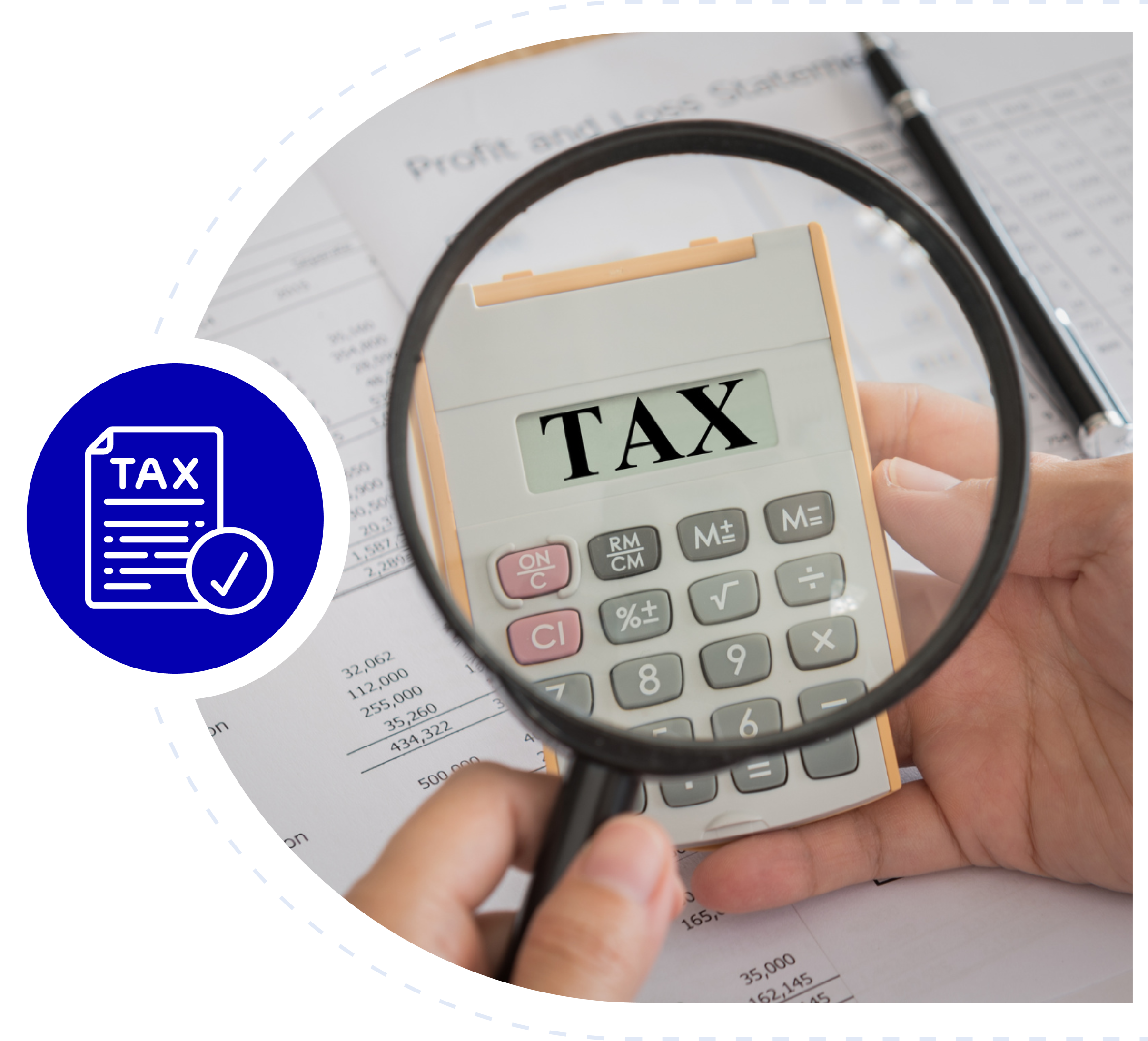Securing Your Financial Future: Accounting and Tax Mastery
Our dedicated team is committed to providing you with tailored financial solutions to meet your unique needs.
Our dedicated team is committed to providing you with tailored financial solutions to meet your unique needs.

Payroll is the process of managing and processing employee compensation, including salaries, wages, bonuses, and deductions within an organization.

A VAT return is a summary of collected and paid value-added tax, submitted periodically to tax authorities.

Self-assessment tax return is a personal financial declaration submitted by individuals to report their income, expenses, and tax liabilities to the tax authorities.

Company accounts and tax filing involve managing financial records and submitting relevant documentation to fulfill regulatory requirements for corporate taxation.

Declarations of inactivity for companies with minimal financial transactions.

Bookkeeping service involves systematically recording and organizing financial transactions to maintain accurate and up-to-date business records.

VAT registration is the formal process by which businesses enroll with tax authorities to collect and remit Value Added Tax on their taxable sales.

A Confirmation Statement Filing is an annual requirement for companies to confirm and update their registered details with the Companies House in the UK.

Enabling employers to deduct and remit taxes from employees' salaries in the UK.

Encompass annual reporting obligations, detailing the social and environmental impact of the organization to ensure regulatory compliance and transparency.

Company closure services facilitate the smooth and legal dissolution of a business entity, handling paperwork, compliance, and financial aspects.
Payroll is the process of managing and processing employee compensation, including salaries, wages, bonuses, and deductions within an organization.

A VAT return is a summary of collected and paid value-added tax, submitted periodically to tax authorities.

Self-assessment tax return is a personal financial declaration submitted by individuals to report their income, expenses, and tax liabilities to the tax authorities.

Company accounts and tax filing involve managing financial records and submitting relevant documentation to fulfill regulatory requirements for corporate taxation.

Declarations of inactivity for companies with minimal financial transactions.

Bookkeeping service involves systematically recording and organizing financial transactions to maintain accurate and up-to-date business records.

VAT registration is the formal process by which businesses enroll with tax authorities to collect and remit Value Added Tax on their taxable sales.

A Confirmation Statement Filing is an annual requirement for companies to confirm and update their registered details with the Companies House in the UK.

Enabling employers to deduct and remit taxes from employees' salaries in the UK.

Encompass annual reporting obligations, detailing the social and environmental impact of the organization to ensure regulatory compliance and transparency.

Company closure services facilitate the smooth and legal dissolution of a business entity, handling paperwork, compliance, and financial aspects.


Company accounts and tax filing involve managing financial records and submitting relevant documentation to fulfill regulatory requirements for corporate taxation.

Declarations of inactivity for companies with minimal financial transactions.

Bookkeeping service involves systematically recording and organizing financial transactions to maintain accurate and up-to-date business records.

Payroll is the process of managing and processing employee compensation, including salaries, wages, bonuses, and deductions within an organization.

VAT registration is the formal process by which businesses enroll with tax authorities to collect and remit Value Added Tax on their taxable sales.

A VAT return is a summary of collected and paid value-added tax, submitted periodically to tax authorities.

Self-assessment tax return is a personal financial declaration submitted by individuals to report their income, expenses, and tax liabilities to the tax authorities.

A Confirmation Statement Filing is an annual requirement for companies to confirm and update their registered details with the Companies House in the UK.

Encompass annual reporting obligations, detailing the social and environmental impact of the organization to ensure regulatory compliance and transparency.

Company closure services facilitate the smooth and legal dissolution of a business entity, handling paperwork, compliance, and financial aspects.

Enabling employers to deduct and remit taxes from employees' salaries in the UK.
At our FAQ hub, unlocking answers is not just a promise but a commitment. Your queries find bespoke solutions crafted with expertise and care.
A VAT number is a unique identification number given to VAT-registered businesses. In England, Scotland and Wales, a VAT number is a nine-digit code with the prefix 'GB'. VAT numbers are issued by HMRC.
In the UK, the VAT registration threshold is currently £85,000 (2023), and the most recent UK VAT thresholds are: 2014-2015: £81,000. 2015-2016: £82,000.
PAYE is HM Revenue and Customs' ( HMRC ) system to collect Income Tax and National Insurance from employment. You do not need to register for PAYE if none of your employees are paid £123 or more a week, get expenses and benefits, have another job or get a pension. However, you must keep payroll records.
The reference number consists of two parts: a three-digit HMRC office number, and a reference number unique to your business. Usually it looks something like 123/A56789 or 123/AB56789, with some exceptions. You will need your employer PAYE reference number for many different reasons.
It defines a micro entity as below-
Adding {{itemName}} to cart
Added {{itemName}} to cart